Published: March 7, 2024
This year's theme is "Women Who Advocate for Equity, Diversity and Inclusion"
In 1980, in conjunction with International Women's Day, President Jimmy Carter asked Americans to celebrate the historical accomplishments of women. In 1981, Congress passed Public Law 97-28 designating the week beginning March 7, 1982 as "Women's History Week," and in 1987, Public Law 100-9 expanded it to a month-long national time of celebration and recognition. Search GovInfo to see joint resolutions recognizing March as "Women's History Month" and Presidential proclamations that celebrate contributions and achievements women have made to the United States.
This year GovInfo is spotlighting the historic contributions and achievements of four women who in their own right exemplified this year's theme.
Mildred "Babe" Didrikson Zaharias - Olympian Gold Medalist, Trailblazer for Women in Sports
 Babe Didrikson broke many barriers for women in many sports, but she was probably best known for her track and field accomplishments and contributions to golf. She set four world records at the 1932 Los Angeles Olympics and won two gold medals and one silver medal.
Babe Didrikson broke many barriers for women in many sports, but she was probably best known for her track and field accomplishments and contributions to golf. She set four world records at the 1932 Los Angeles Olympics and won two gold medals and one silver medal.
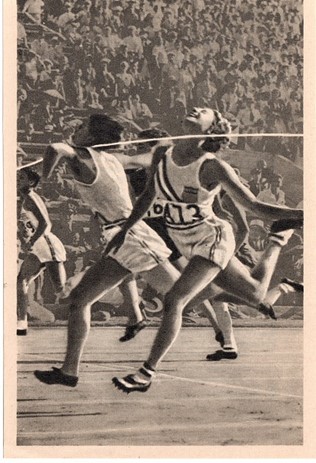 At the Olympics, she qualified for three different events, but women athletes were also limited to only compete in three events. Even though she dominated in women's golf and won the U.S Women's Open twice, she was barred from the U.S. Open which only allowed men to participate. She inspired women with her passion and drive for athletics, and she helped found the Ladies Professional Golf Association. She died at the age of 45 from cancer. In 2021 she was posthumously awarded the Presidential Medal of Freedom for her contributions to athletics.
She is included in the Congressional Record Volume 164, Issue 24 (February 7, 2018) as one of a group of inspiring figures in the history of women's sports who overcame difficult obstacles in their lives to advance participation by women in sports. She set examples for the generations of female athletes who continue to inspire people in the United States today. Check out the
National Archives Comes Alive! Young Learners Program - Meet Babe Didrikson , to learn more about her life in this live dramatic performance.
At the Olympics, she qualified for three different events, but women athletes were also limited to only compete in three events. Even though she dominated in women's golf and won the U.S Women's Open twice, she was barred from the U.S. Open which only allowed men to participate. She inspired women with her passion and drive for athletics, and she helped found the Ladies Professional Golf Association. She died at the age of 45 from cancer. In 2021 she was posthumously awarded the Presidential Medal of Freedom for her contributions to athletics.
She is included in the Congressional Record Volume 164, Issue 24 (February 7, 2018) as one of a group of inspiring figures in the history of women's sports who overcame difficult obstacles in their lives to advance participation by women in sports. She set examples for the generations of female athletes who continue to inspire people in the United States today. Check out the
National Archives Comes Alive! Young Learners Program - Meet Babe Didrikson , to learn more about her life in this live dramatic performance.
Ada Deer - Native American Civil Rights Activist
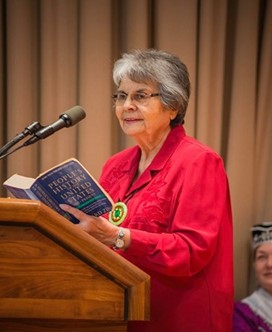 Ada Deer was born on the Menominee Indian Reservation in Keshena, Wisconsin. She learned about Native American culture from her mother who served as a nurse for the Bureau of Indian Affairs in South Dakota and then moved to Wisconsin and married a Menominee man. She attended many Menominee council meetings at an early age. She attended the University of Wisconsin-Madison on a tribal scholarship, and she was the first from the Menominee Tribe to graduate from the University. In addition, she was the first Native American to earn a Master's Degree in Social Work from Columbia University.
Ada Deer was born on the Menominee Indian Reservation in Keshena, Wisconsin. She learned about Native American culture from her mother who served as a nurse for the Bureau of Indian Affairs in South Dakota and then moved to Wisconsin and married a Menominee man. She attended many Menominee council meetings at an early age. She attended the University of Wisconsin-Madison on a tribal scholarship, and she was the first from the Menominee Tribe to graduate from the University. In addition, she was the first Native American to earn a Master's Degree in Social Work from Columbia University.
In the 1970s she moved to Washington D.C. where she continued lobbying for Native Americans rights. After years of work with members of Congress, in 1973, President Nixon signed the
Menominee Restoration Act, restoring the Tribe's federal protection and allowing for tribal control over its properties and businesses. In 1993, President Clinton appointed her to serve as the Assistant Secretary for Indian Affairs at the Bureau of Indian Affairs which allowed her to help establish policies for American Indian tribes. In 2010 she was recognized for her work on behalf of American Indians by the National Association of Social Workers. Throughout her entire career, she was an advocate for her Tribe and all Native Americans focusing on in the rights of American Indians, youth, and women. In 2023, she died in her home state of Wisconsin. Read the many mentions of her work as an advocate and leader in issues of the Congressional Record, and read more about her life on the National Park Service's website.
Maggie Lena Walker - Entrepreneur, Business Leader, Civil Rights Activist
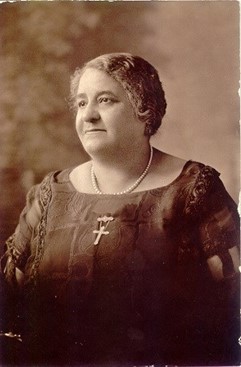 Maggie Walker was born in Richmond, Virginia in 1864 to the mother of a former slave and white Confederate soldier. She spent her life devoted to civil rights advancement, economic empowerment and seeking out opportunities for African Americans, which included opening a department store, editing a newspaper, and in 1903 becoming the first African American woman to charter a bank. She served on the board of trustees for many women's groups as an advocate for African American women's rights. She is also known for leading the Independent Order of St. Luke, which was a group that helped the sick and promoted humanitarian causes, while encouraging self help and integrity.
Maggie Walker was born in Richmond, Virginia in 1864 to the mother of a former slave and white Confederate soldier. She spent her life devoted to civil rights advancement, economic empowerment and seeking out opportunities for African Americans, which included opening a department store, editing a newspaper, and in 1903 becoming the first African American woman to charter a bank. She served on the board of trustees for many women's groups as an advocate for African American women's rights. She is also known for leading the Independent Order of St. Luke, which was a group that helped the sick and promoted humanitarian causes, while encouraging self help and integrity.
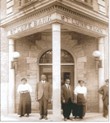 Money received from the members of the Independent Order of St. Luke allowed Walker to open the St. Luke Penny Savings Bank.
She saw the need for a bank for African Americans because white-owned banks did not readily accept deposits from Black organizations. Even though many Black-owned banks closed during the Great Depression, Walker's bank was able to merge with two smaller Black-owned banks in 1930 and survive. Walker died in 1934 due to complications from Type 2 diabetes.
Following her death, her daughter-in-law preserved her home that was originally purchased by Walker and her husband in 1904. In 1979, Walker's granddaughter sold the home to the National Park Service and it is now a designated as a National Historic Site. Learn more about Maggie Walker, this historic site and fun-filled educational programs offered on the National Park Service's website . Read a tribute for her contributions as a business woman and community leader, in the Congressional Record Volume 147, Issue 45 (March 30, 2001).
Money received from the members of the Independent Order of St. Luke allowed Walker to open the St. Luke Penny Savings Bank.
She saw the need for a bank for African Americans because white-owned banks did not readily accept deposits from Black organizations. Even though many Black-owned banks closed during the Great Depression, Walker's bank was able to merge with two smaller Black-owned banks in 1930 and survive. Walker died in 1934 due to complications from Type 2 diabetes.
Following her death, her daughter-in-law preserved her home that was originally purchased by Walker and her husband in 1904. In 1979, Walker's granddaughter sold the home to the National Park Service and it is now a designated as a National Historic Site. Learn more about Maggie Walker, this historic site and fun-filled educational programs offered on the National Park Service's website . Read a tribute for her contributions as a business woman and community leader, in the Congressional Record Volume 147, Issue 45 (March 30, 2001).
Annie Jump Cannon - Astronomer, Trailblazer for Women in Science
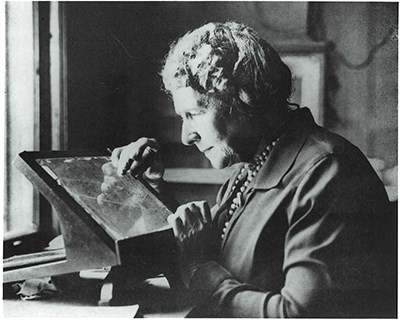 Annie Jump Cannon was a student of physics and astronomy at Wellesley College, worked at Harvard Observatory, and is known for developing the modern stellar classification system. She cataloged around 350,000 stars in her lifetime. She was hired at Harvard College Observatory as an assistant in the late 1800s. Although she received low pay and had no room to advance, she was able to make many significant contributions to astronomy. She was the first woman to be awarded an honorary doctorate from the University of Oxford in 1925, and she was the first woman officer of the American Astronomical Society (AAS). She was also a strong advocate for women's voting rights.
Annie Jump Cannon was a student of physics and astronomy at Wellesley College, worked at Harvard Observatory, and is known for developing the modern stellar classification system. She cataloged around 350,000 stars in her lifetime. She was hired at Harvard College Observatory as an assistant in the late 1800s. Although she received low pay and had no room to advance, she was able to make many significant contributions to astronomy. She was the first woman to be awarded an honorary doctorate from the University of Oxford in 1925, and she was the first woman officer of the American Astronomical Society (AAS). She was also a strong advocate for women's voting rights.
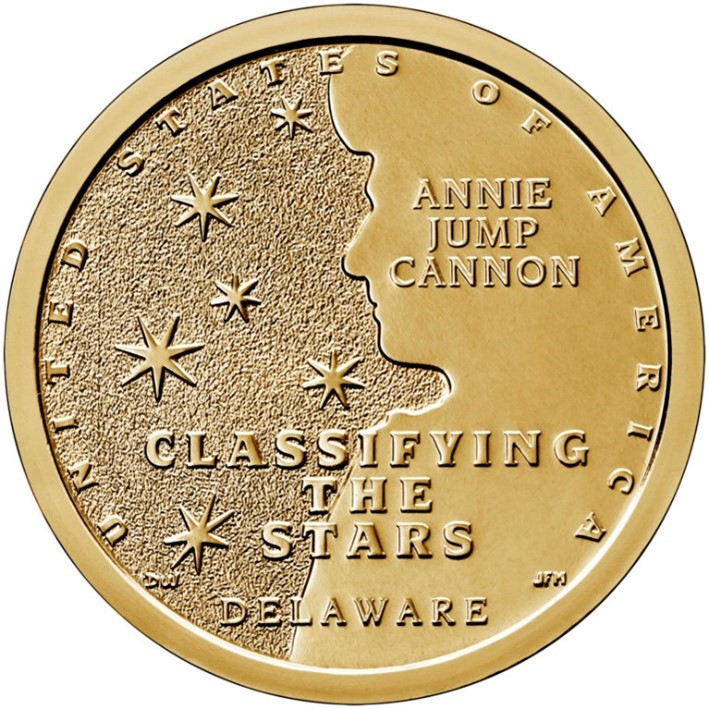 In 2019, the American Innovation $1 Coin representing Delaware honors internationally recognized astronomer Annie Jump Cannon as a pioneer in science.
The obverse (heads) design features a dramatic representation of the Statute of Liberty in profile. The reverse (tails) design features a silhouette of Annie Jump Cannon against the night sky, with a number of stars visible in the sky. The authorizing legislation for this coin was under the American Innovation $1 Coin Act. Read more about her accomplishments and other pioneering women in STEM on the National Science Foundation's website.
In 2019, the American Innovation $1 Coin representing Delaware honors internationally recognized astronomer Annie Jump Cannon as a pioneer in science.
The obverse (heads) design features a dramatic representation of the Statute of Liberty in profile. The reverse (tails) design features a silhouette of Annie Jump Cannon against the night sky, with a number of stars visible in the sky. The authorizing legislation for this coin was under the American Innovation $1 Coin Act. Read more about her accomplishments and other pioneering women in STEM on the National Science Foundation's website.
Additional Article Sources and Resources
- Read how the Smithsonian American Women’s History Museum celebrates Women’s History Month 2024 with their "Inaugural Digital Exhibition and New Initiatives".
- Learn about more "Remarkable Legacies of American Women" , explore their stories, and celebrate women's history in national parks, on the National Park Service's website .
- Explore "Women's History Month: A Commemorative Observances Legal Research Guide" on the Library of Congress' website .
About Featured Content Articles – This series of articles aims to highlight content available in GovInfo related to various national observances, commemorations, anniversaries and more. See more featured content articles.